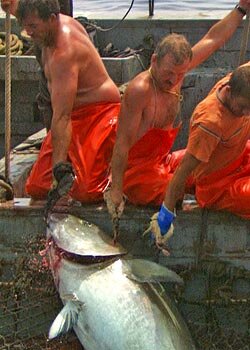US domestic trade legislation could be used to save the Atlantic bluefin tuna after the failure of an international body to restrict rampant over-fishing of the endangered species.
Conservationists and concerned scientists are discussing applying for a US import ban after a UN-recognised body set up to manage Atlantic and Mediterranean tunas awarded fishermen a total allowable catch in excess of what scientists recommended amid warnings that the stock could collapse.
Member nations of the International Commission for the Conservation of Atlantic Tunas awarded fishermen in the Mediterranean and Eastern Atlantic a quota of 22,000 tons this year against a scientific recommendation of 8,000-15,000 tons.
The United States is now a net importer of bluefin tuna, which would mean import restrictions against fish caught and ranched in the Mediterranean could have an effect on reducing international trade and placing pressure on other nations to follow suit.
Options being discussed by conservationists include a listing under the US Endangered Species Act and a listing under Appendix II of the Convention on International Trade in Endangered Species (CITES), which restricts trade in caviar and elephant ivory, but both of these would be hotly opposed by fishermen and fishing nations.
A resolution by the UN general assembly to reduce catches of bluefin tuna is another option under consideration.
Andrew Sharpless, executive director of Oceana, said: “ICCAT has shown that its true name is I CAN’T. It can’t find the courage to save the bluefin tuna from being commercially hunted and killed to where it is in danger of disappearing forever.
“We are appalled at their disregard of what science clearly shows about this tiger of the deep.
“While conservationists aren’t ready to let ICCAT off the hook, we are also looking for other forums - perhaps CITES - to save the bluefin. ICCAT has fiddled away incredibly precious time. If the bluefin collapses, it will be ICCAT’s fault.”
Another US domestic measure under consideration is the closure of areas of the sea to pelagic longliners in the Gulf of Mexico when tuna migrate. Although killing bluefin on long lines has been prohibited since 1981, there is an incidental catch of bluefin on lines set for other species.
Some scientists believe that nothing short of a moratorium on all landings from the interconnected western and eastern Atlantic populations of bluefin is necessary.
Proposals for dealing with the rampant illegal fishing of bluefin as they migrate from the Atlantic to the Mediterranean to spawn are being assembled ahead of the arrival of the Obama administration and the replacement of top fisheries officials.
Dr Jane Lubchenco, one of the nations’ top marine conservation scientists, is taking over as the new head of the National Oceanic and Atmospheric Administration (NOAA).
One source described listings under the US Endangered Species Act as “incredibly challenging,” with many groups opposing listing on principle.
Fishing organizations fear that listing a commercially important species will set a precedent, and many others will be listed.
There are two different levels of listing, threatened and endangered, with endangered being more difficult to attain. In the event of an endangered species listing, all imports and domestic harvest of bluefin tuna would be prohibited.
The recreational fishery for bluefin on the eastern coast of the US would be catch-and-release only.
The problem with the Act is that it does nothing to fisheries outside of the US, and some fear that closing domestic fisheries would result in the US losing a seat at ICCAT’s negotiating table.
Only a fraction of landings are imported into the US, so some question whether an ESA listing would actually help to rebuild the species.
The path to CITES is an equally difficult one. Bluefin tuna have been proposed for listing twice in the past and both petitioning nations were pressured into withdrawing their proposals.
The first challenge is identifying a nation to propose listing - it must be a range state. Individuals or organizations can not submit a CITES petition.
Development of the petition would not be a problem as there is ample scientific support for listing. An Appendix I listing, which would ban all trade, would be the most effective result.
Appendix II only requires trade monitoring, which already exists through ICCAT, though the tonnages allowed for trade might be lower.
Some nations, such as Japan, are vehemently opposed to listing marine species on CITES, even if they do admit that bluefin are in trouble, making it more difficult.
Even if bluefin are listed under CITES, domestic markets can remain open – which has proved a problem with caviar in Russia.
Libya, for example, has pledged that in the event of a CITES listing, they will catch the same number of fish and can them for domestic markets.
WWF International are strongly in favour of the Cites route. Dr Sergi Tudela, Head of Fisheries for WWF Mediterranean, said: “The Mediterranean bluefin tuna fiasco is a case study of mismanagement in our beleaguered oceans.
“There is widespread overfishing, illegal fishing, under-reporting, catching of juveniles, ridiculous fleet overcapacity - the list goes on. We are witnessing a gold rush to scoop up as much tuna as possible while it’s still there, and governments are doing nothing to stop this.
“We have a major crisis on our hands. This management failure is happening on our watch and jeopardising an amazing species and a millennial fishing tradition - but there is no political will to put the brakes on and give Mediterranean bluefin a chance of survival in the long term.
“What we need is an immediate closure of the fishery pending sustainable management, but in the absence of this WWF is actively seeking to ensure that Mediterranean bluefin tuna is given the maximum level of protection under CITES, effectively trying to ban international trade - something must be done or our grandchildren will ask us why we sat back and allowed a catastrophe to happen.”
![]()



0 Responses to “US trade embargo could save bluefin tuna”
Leave a Reply